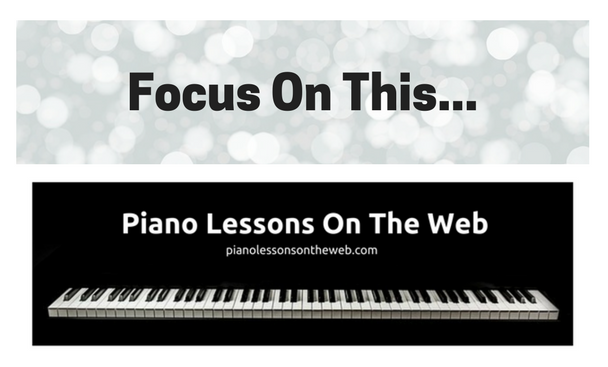 Learning to play the piano is really all about simplifying what is too difficult to do at first.
With everything we learn in piano playing, we have to break down or simplify the concept and the technique that we're trying to master in order to do just that...master it. So why isn't it easier to master what we're trying to learn then, if it's really that easy!? I truly believe that in our passion and zeal to learn everything we can at one time...we take on too much. Think about how exciting it is to take on a new piece that you absolutely love (!) only to find out how hard it is when you start trying to play it for the first time. The enthusiasm remains and you tackle as much as you can, as fast as you can...do get that thing learned because you can't wait to play it somewhere. But then the techniques prove to be more challenging than you thought...and that enthusiasm has waned a bit, and the next thing you know, that piece gets put in the back of your music library. Our enthusiasm takes us right over the part where we break things down. In other words...we end up bypassing the very thing we need in order to really take flight during a good performance. The way to capture that zeal into practical application is by honing into one thing each week and master it. Just that one.
Whatever your challenges are...make a list of each one. Then take that list and break it down week by week. Spend the first week on the rhythm for example and work only on that. Then move on to the next challenge when you've mastered the previous one. It may take more than a week, and some things may take less than a week. The more you practice this way of learning a new piece or exercise the better you will know how long it takes you to master specific things. The main point is to do only one a a time. Don't work on 2 things from your list at the same time. It's fine to review over what you've been working on...but do that separately from your actual practice/work time in your playing. Professional multitaskers might thinking this is silly and believe that they can successfully work on more than one thing at a time...but remember that we're already multitasking when we're playing the piano...our minds are always on more than one thing. That's why it is so important when you are learning something new on the piano to in fact learn things individually and one at a time due to the fact that you are...already thinking about more than one thing. Too much multitasking just causes mental and even physical exhaustion. So relax...enjoy the idea of keeping things simple in your piano practicing and you might find that you start using that same concept in other areas of your life...especially when you see the benefits of this in your piano playing! Stay Tuned to pianolessonsontheweb.com and learn much more to achieve your dream of playing the piano!
Linda
4/26/2018 03:45:07 pm
Just what i needed to hear today! I was getting frustrated yesterday, and therefore did not play today... Now u feel like practicing a little while! Thanks tim
Reply
tim
5/9/2018 12:06:08 pm
You are welcome Linda. My writer Robin wrote this one so I am extra glad you found it helpful!
Reply
When children learn to play the piano then there are dozens of keys that should be pursued. All notes in piano music will need a key. Then the movement of the fingers of the right and left hands must move in balance with the rhythm. Learning the piano itself will increase the brain connections that are important for improving the performance of the brain in the future, especially very influential to complete non-musical motor duties in the future.
Reply
Ziggie
5/7/2018 03:22:22 pm
Yes, you are spot on, Tim.
Reply
Leave a Reply. |
AuthorMost blogs written by Archives
June 2020
Categories
All
|

 RSS Feed
RSS Feed